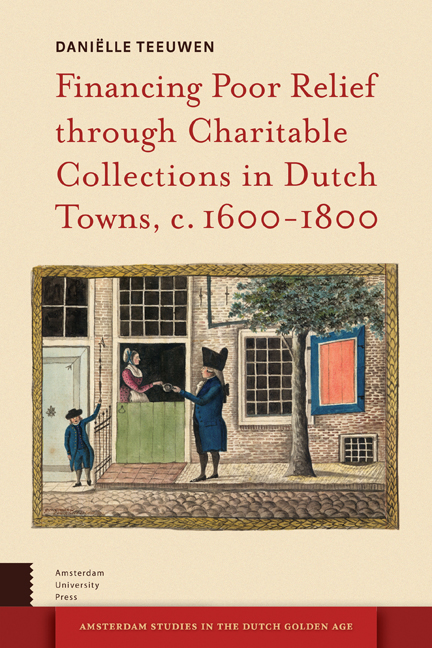4 - Organizing Collections
Published online by Cambridge University Press: 10 December 2020
Summary
On 25 June 1766, a fire which began in a butcher's shop, quickly spread through the small town of Hilversum, destroying over 200 houses as well as a school building, the vicarage, the Dutch Reformed church and its tower, and many other public buildings. The total damage was calculated at 332,341 guilders, which was far more than the inhabitants of Hilversum would be able to raise amongst themselves. For this reason, the delegated representatives (Gecommitteerde Raden) of Holland's South Quarter allowed Hilversum's municipality to organize collections in this part of the country. Next, as it was ultimately up to the towns whether they wished to follow this provincial decision, representatives of Hilversum travelled the country to persuade local authorities to cooperate. In the end not only in Holland, but also in several towns outside of this province, collections were held to assist the Hilversum population. To encourage generous giving and make people aware of the scale of the disaster, an engraving was made depicting a burning church and several elements of the collecting procedure, as well as a poem giving a detailed description of the miserable situation of Hilversum's inhabitants and praising the charitable act. All of these efforts were not without result; in total a sum of 108,695 guilders was collected in different parts of the Dutch Republic, almost half of which was donated by the inhabitants of Amsterdam.
One of the towns showing compassion with the Hilversum population was Utrecht. Shortly after the fire, on 10 July, the town council gave permission for a collection to be organized door-to-door within the town walls as well as in the surrounding areas. The collection, which was scheduled for 16 October, was announced both by members of the church board during Dutch Reformed services, and through printed publications in the streets. Messengers from the city council and the civic militias assisted Hilversum's representatives in going door-to-door, for which they received financial compensation. Afterwards, the revenues were counted by the captains of the civic militias at the city's administrative office. After subtraction of the expenses, a total of 3,663 guilders remained, which was at first safely kept in a locked box at the city's financial office, and transported to Hilversum on 2 February 1767. However, not all towns were as helpful as Utrecht.
- Type
- Chapter
- Information
- Publisher: Amsterdam University PressPrint publication year: 2015



